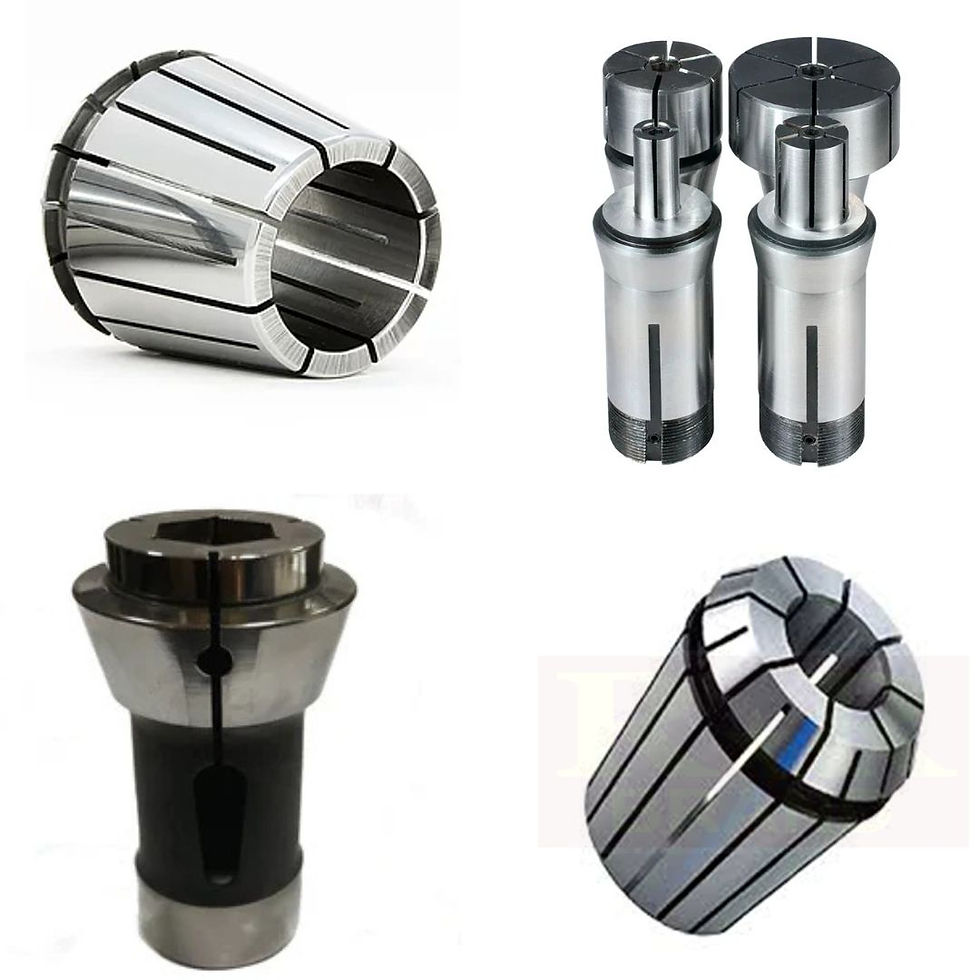Comparing ER, R8, and 5C Collets: What Works Best for You?
- nazmakhatoon1057
- Jul 26, 2025
- 3 min read
In precision machining, selecting the right collet system is essential for maximizing performance, ensuring accuracy, and achieving optimal productivity.

With several options available in the market, machinists often find themselves choosing between ER collets, R8 collets, and 5C collets.
Each of these collet systems has distinct features, strengths, and limitations, making them suitable for different applications.
In this blog, we will compare ER collets, 5C collets, and R8 collets, helping you determine the best fit for your machining needs—especially if you're operating a tool room or CNC or any other manufacturing hub.
Understanding the Basics of Each Collet Type
1. ER Collets: Versatile and Widely Used
ER collets are among the most versatile collet systems and are widely used across CNC machining centers.
Developed to DIN 6499 standards, ER collets come in various sizes (e.g., ER11, ER16, ER32, ER40) and are known for their ability to clamp a range of tool diameters (typically ±1 mm).
They provide excellent concentricity and grip strength, making them ideal for high-speed operations.
2. 5C Collets: Popular for Lathes and Grinders
5C collets are an older, but still widely used, collet system, especially for turning and grinding operations.
These collets are often used in manual or semi-automatic lathes and work best for holding round stock.
However, they offer limited clamping range and generally require workpieces or tools to match the exact collet size.
3. R8 Collets: Designed for Bridgeport-Style Milling Machines
R8 collets were designed specifically for Bridgeport milling machines and their clones. These collets are commonly used in vertical milling machines for tool holding.
They are limited to direct tool shank sizes and offer less flexibility compared to ER collets.
Key Comparisons: ER vs R8 vs 5C Collets
1. Versatility and Range of Sizes
ER Collets shine in terms of flexibility. A single ER collet can accommodate a range of tool shank sizes, reducing the need for multiple collets.
5C Collets are rigid in size. You’ll need a separate collet for every different size of material or tool.
R8 Collets offer limited range and are typically only used for tool holding in specific milling machines.
Conclusion: For workshops in growing industrial cities like, where diverse machining needs arise, ER collets provide greater convenience and cost efficiency.
2. Concentricity and Runout
ER Collets provide excellent concentricity (typically within 0.005 mm), making them ideal for high-precision CNC applications.
5C Collets offer good concentricity but are slightly behind ER collets when it comes to high-speed rotation stability.
R8 Collets have more runout due to their design and are generally not suitable for ultra-precise operations.
Conclusion: For high-speed, accurate work, ER collets outperform both R8 and 5C collets.
3. Application Suitability
5C Collets are preferred for holding bar stock in turning applications. They're also used in collet blocks for secondary operations.
ER Collets are perfect for both tool holding and work holding in CNC machines, milling, and drilling.
R8 Collets are specifically used in Bridgeport-type milling machines for tool holding and aren’t generally suitable for work holding.
Conclusion: 5C collets work well in turning operations, but ER collets offer broader functionality across multiple machining processes.
4. Ease of Use and Setup
ER Collets are quick to change with the use of torque wrenches and collet chucks.
5C Collets often use drawbar systems and require more manual effort for changing parts.
R8 Collets are easy to use in dedicated machines but lack compatibility with other systems.
Conclusion: If you need faster setups and reduced downtime in a busy machine ER collets again take the lead.
Which Collet System Should You Choose?
Choose ER Collets if:
You run a CNC workshop.
You need a collet system that supports high RPMs.
Your work demands high concentricity and minimal runout.
Choose 5C Collets if:
You do a lot of turning or grinding with round bar stock.
You want a stable and proven collet system for lathes.
Choose R8 Collets if:
You operate a Bridgeport-style vertical milling machine.
You have limited tooling needs specific to tool holding.
Final Thoughts
Each collet system—ER collets, 5C collets, and R8 collets—has a role to play in modern machining.
However, ER collets offer the most balanced mix of precision, versatility, and ease of use, making them a preferred option for most advanced machine shops.
If you're operating a manufacturing unit or looking to upgrade your tool holding capabilities, investing in ER collets is a smart, future-ready choice.

Comments